About Us
Julia Tantillio is a senior Sociology major graduating this May. She enjoys the outdoors, fitness, animals, and spending time with her friends. Gianna Caputo is a senior Communication Management and Design major at Ithaca College, also graduating this May. She enjoys writing and reading poetry, spending time outdoors, and cafes in small cities. Rachel Rosenberg is a sophomore studying English, graduating in May of 2021. She enjoys art, playing tennis, hiking, and cooking. All three individuals have a deep commitment to community betterment and enjoy working in teams to bring about change.
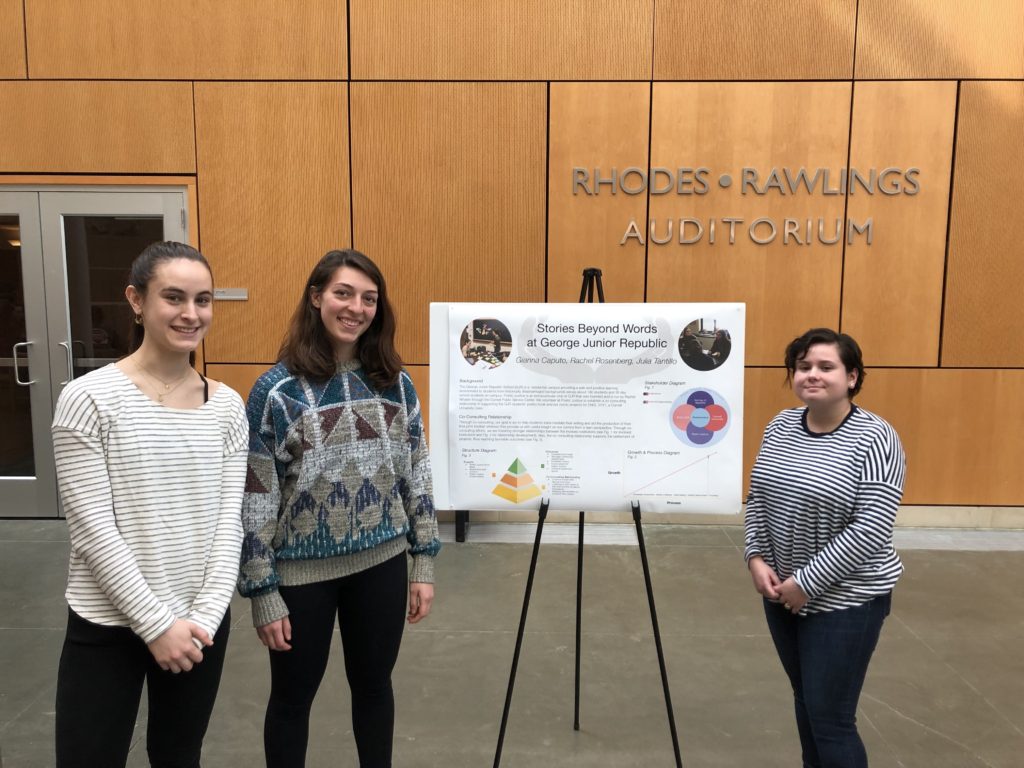
Background
We are three students who are enrolled in Media, Design, and Engagement (ENGL 3741), a Cornell University English Department course dedicated to media and design-based approaches to community engagement. We each come from backgrounds that lend themselves to such a creative, social-justice-focuses mission: English, Sociology, and Media Design. As part of that class through a semester-long project we worked to cultivate a campus-community co-consulting partnership with the George Junior Republic (GJR) school’s Poetic Justice extracurricular club. This project’s goal was to foster community engagement through the design and media of our comics and their poems. Our roles were to act as liaisons between George Junior Republic and Cornell University, give creative consulting feedback on their poems, and to receive creative consulting feedback on our comics from GJR students. The George Junior Republic school is a district providing a safe and positive learning environment to students from historically disadvantaged backgrounds, often with drug use and abuse. GJR currently serves about 190 residential students and 30 day school students on their campus in Freeville, NY, about a 15-minute drive away from the campus of Cornell University. GJR functions as a part of a larger umbrella organization and residential campus, the William George Agency, that provides programs for young adults, including counseling, chemical dependency rehabilitation services, emotional/behavioral assistance, and educational and extracurricular activities.
As a group of three students, from both Cornell and Ithaca College, we helped an extracurricular group at GJR called Poetic Justice to write, edit, and design poems they have been working on to produce an anthology of poetry. Poetic Justice was founded and has been run by Cornell senior Rachel Whalen through the Public Service Center (PSC) since the spring of 2017. We volunteered at Poetic Justice on a weekly basis to establish a co-consulting relationship in supporting the GJR students in reaching their goals in the poetry project and also to receive feedback on our own media and design comic projects for the ENGL3741 class. Through co-consulting, our goal was to help students trans-mediate their writing and aid the production of their final print booklet and in turn they provided us with useful insight on our comics from a teen perspective. Both educational institutions, Cornell University and the George Junior Republic school, have resources dedicated to engaging their students in their communities. GJR displays their mission statement to be:
“George Junior Republic is dedicated to helping at-risk youth become successful, well-adjusted adults, capable of achieving a higher degree of citizenship and a better understanding of his responsibility to society, family and self.”
Aligning our class goals and projects to this statement, as well as the mission of Cornell to foster public engagement and citizenship, and having awareness was essential in setting a solid foundation to build upon. During the whole process, we were focused on fostering strong community relationships between the institutions involved and the additional stakeholders (see Fig. 1). With special attention to the individual missions and goals of the associated organizations, we were mindful of the role that we were stepping into, asked for feedback, and engaged in the learning process throughout to create strong connections. Co-consulting was significant in shaping and supporting the projects for both organizations, Poetic Justice and ENGL3741, and can serve as a model for future efforts to bring media and design into communities.

Hear
The most significant part of our work with the students at GJR and in working through this project was ultimately the relationships we were able to build and sustain. In Figure 3 we show the process and our priorities; the co-consulting relationship is our foundation, everything else needed to be built upon the working relationship. In our initial meetings with the students, we kept this consideration at the forefront of our minds; we would go in not as overbearing, all-knowing, authority figures, but rather as peers there simply to listen and get an idea of the project their were doing from their perspective. This is an important takeaway from our in class readings, including the Art of Transformation, because of what it has taught us about being conscious designers and organizers regarding listening to the voices of the stakeholders and people that will be impacted by the project. After organizing with Rachel Whalen and Jon McKenzie, we scheduled to meet with the students during the meeting time of their Poetic Justice club on Monday afternoons. We knew that we would have limited time with the teens and wanted to make sure we respected the activities and plans that Rachel had for their day. The very first day, we were expecting to simply observe and to have some barriers connecting with the students the first time. We were greeted and pleasantly surprised by smiles and almost immediate willingness to talk to us and to directly ask for feedback on the poems they were currently working on. As visitors, we spent the majority of our time listening to them and reading over their work, occasionally giving small ideas for editing and lots of encouragement for the many ideas that they were considering for new poems.
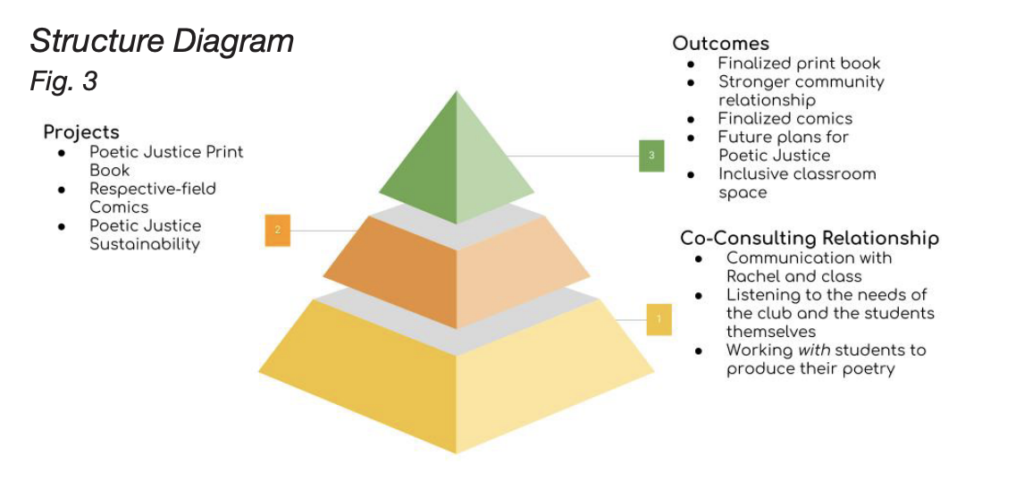
Create
Our comic project, when discussed with the students present in Poetic Justice, seemed very exciting and they were eager to hear ideas and provide feedback. The first “pitch” session involved us sharing our ideas and draft sketches with three students present at the club meeting that day. In a round robin style, we each presented the work we had completed thus far, and let each student present ideas for further development and solutions for the narrative itself. Each of us took notes on the feedback we gained, and actively worked to include it in our final drafts. Since the students were a part of our target demographic, we felt that including them was a vital part of the comic project process. Additionally, each student expressed interest in reading a final draft or completed comic at the end of the project. This experience was especially formative not only for content creation, but in strengthening our relationship with the students. The nature of the programs at George Junior Republic is dependent on structured schedules and tailored curriculum. The students are rarely presented an opportunity in which they are considered the expert on a subject or leader of a process. By including them in our comic process, we add a second opportunity to the one already present through the club, empowering students and valuing their input as individuals and experts.
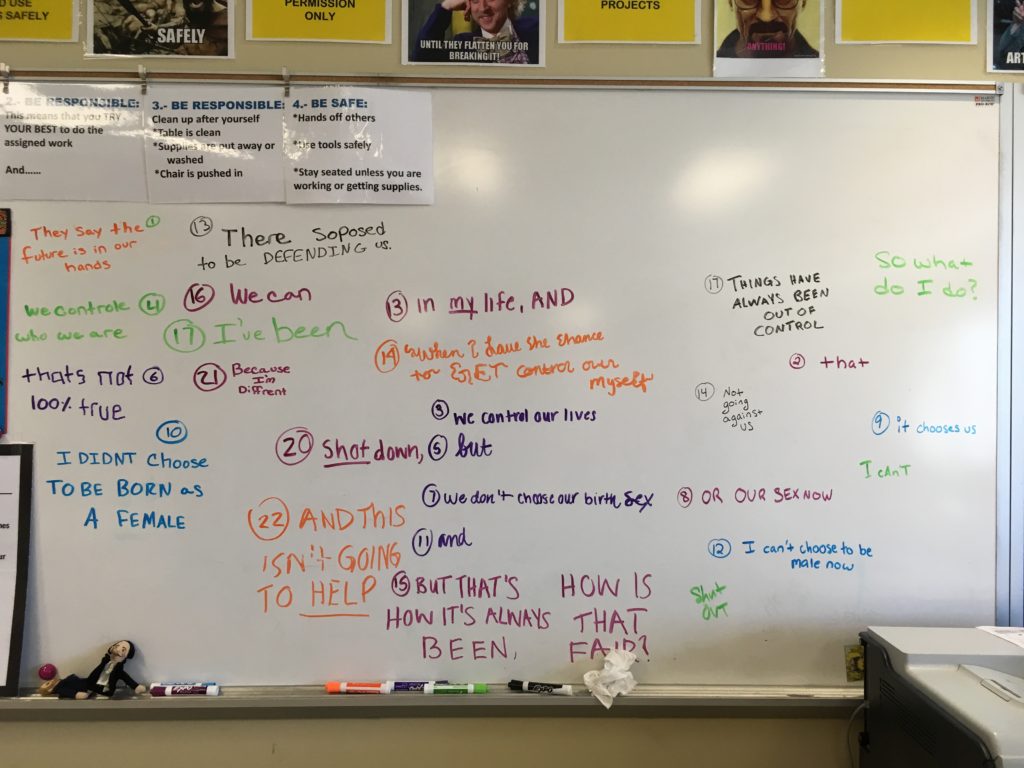
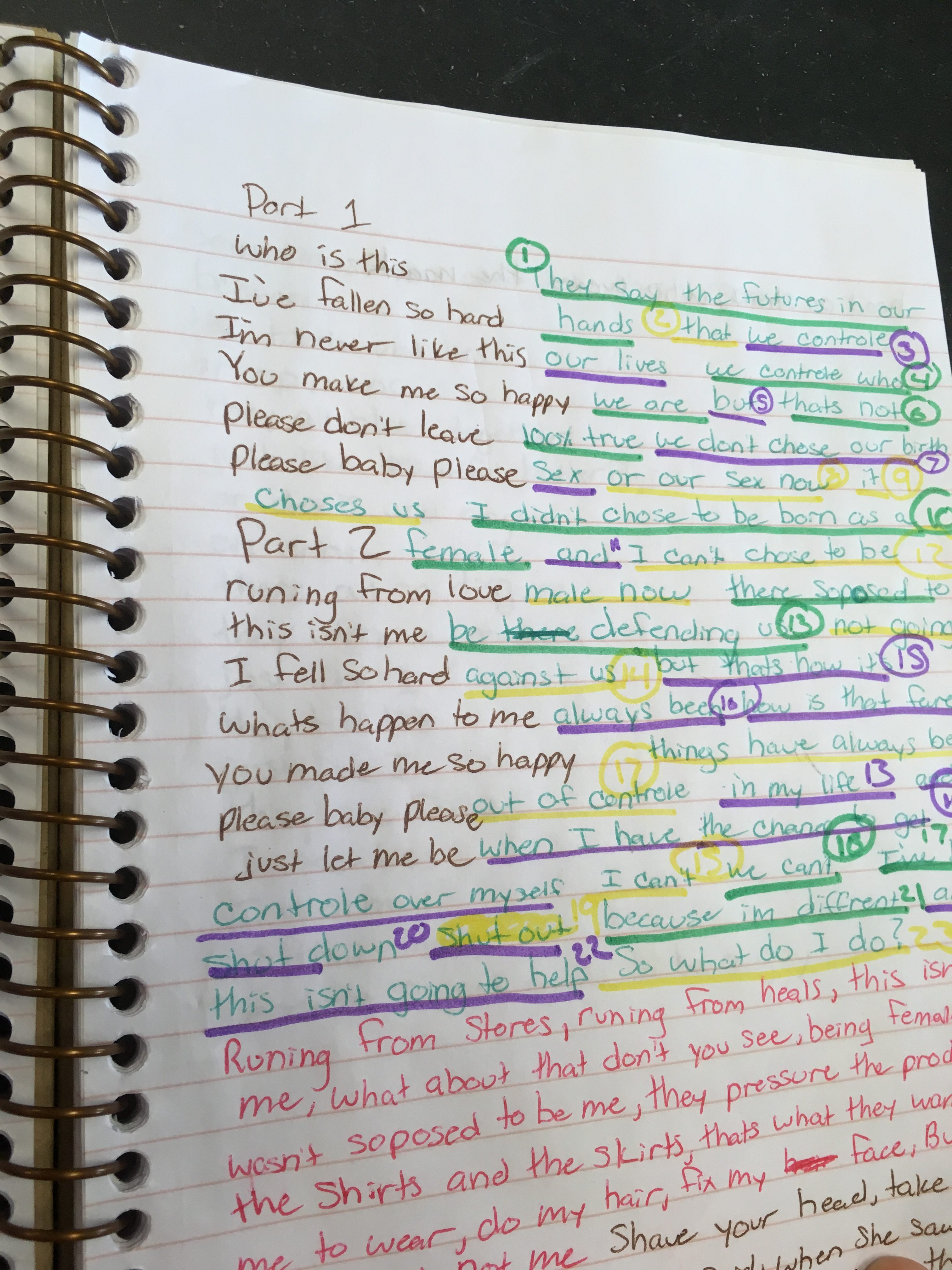
We also were able to provide feedback to students on their work. Specifically, we worked very closely with Jonathon, who was interested in formatting their work differently than usual. After throwing around ideas, Jonathon decided to use different colored markers with different styles of handwriting to depict each line of a poem in their notebook. Mapping out each section and assigning a certain color to each writer ensured that we all contributed to the poem with unique styles of handwriting. At the end of the process, Rachel Whalen took photos of each individual line for later assembly in Photoshop, as well as a photo of the entire board. Working with Jonathon to bring their idea to life was special and allowed us to assist them after they had been so helpful during the comic feedback process. Students would also show us work in their notebooks and ask for our thoughts, our show us their progress in writing. Each student’s notebook was a place for keeping poems that would eventually be transposed into book pages. They could bring their notebooks home with them, and continue to write freely in that manner, or they could write poems on other mediums and bring them in to be copied into their notebooks. In this way, students were encouraged to share only what they were comfortable with. Our presence may have seen jarring at first, but we were soon welcomed into a safe, warm environment where we could all engage in thoughtful discussions about each students’ work.
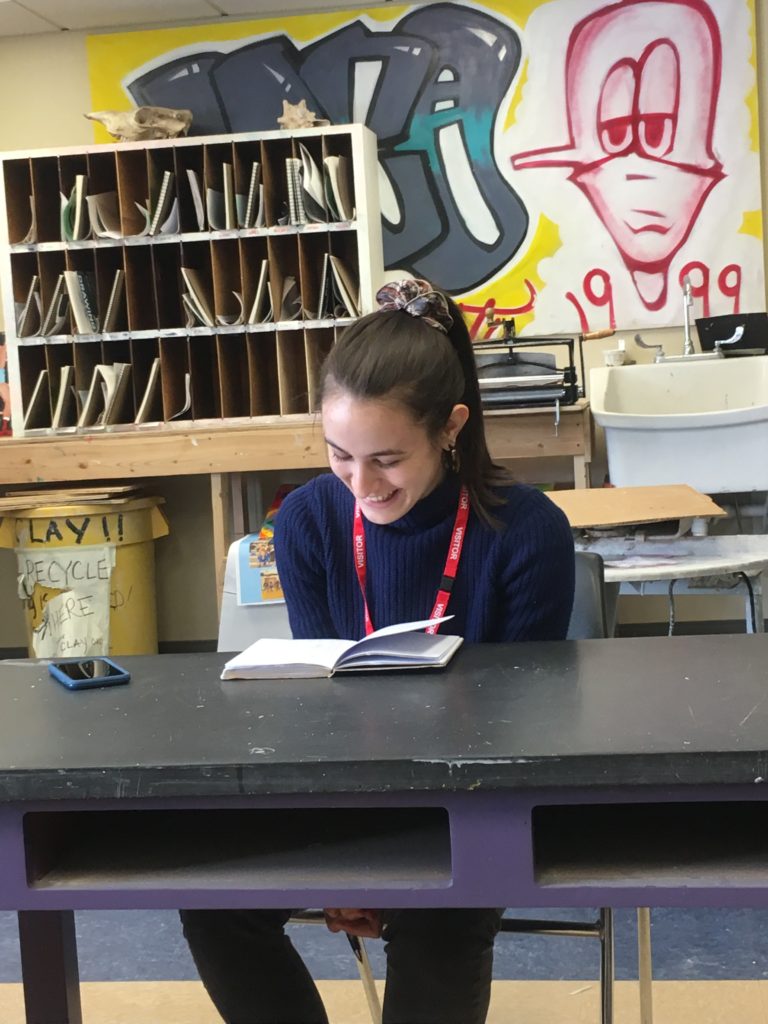
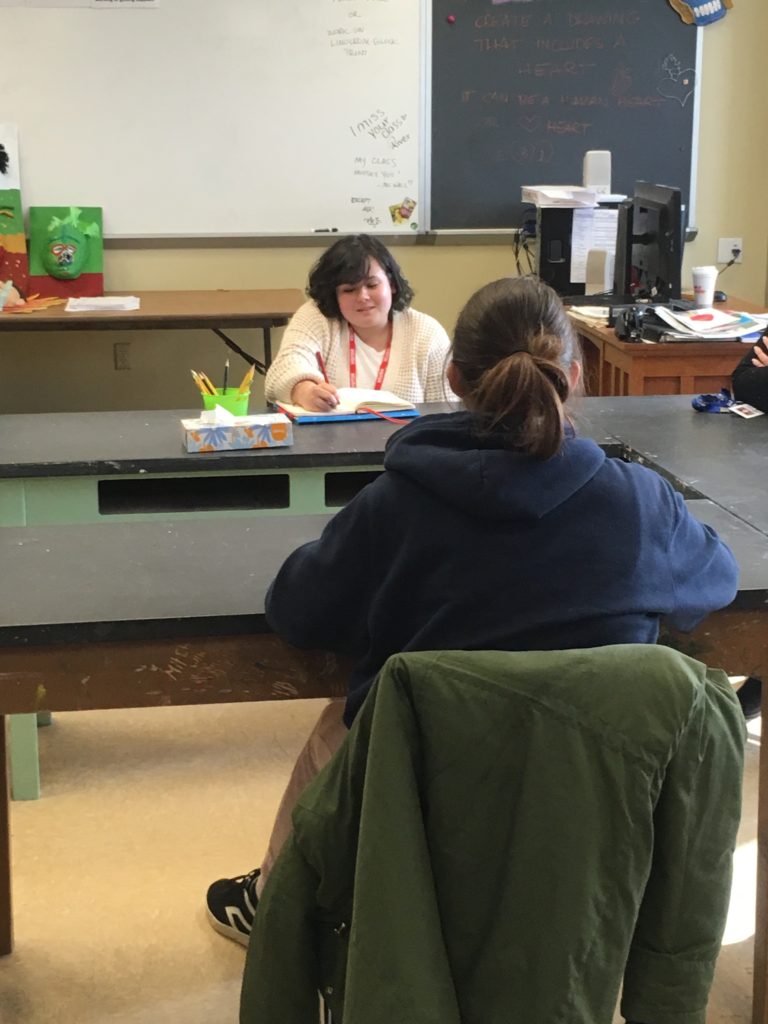
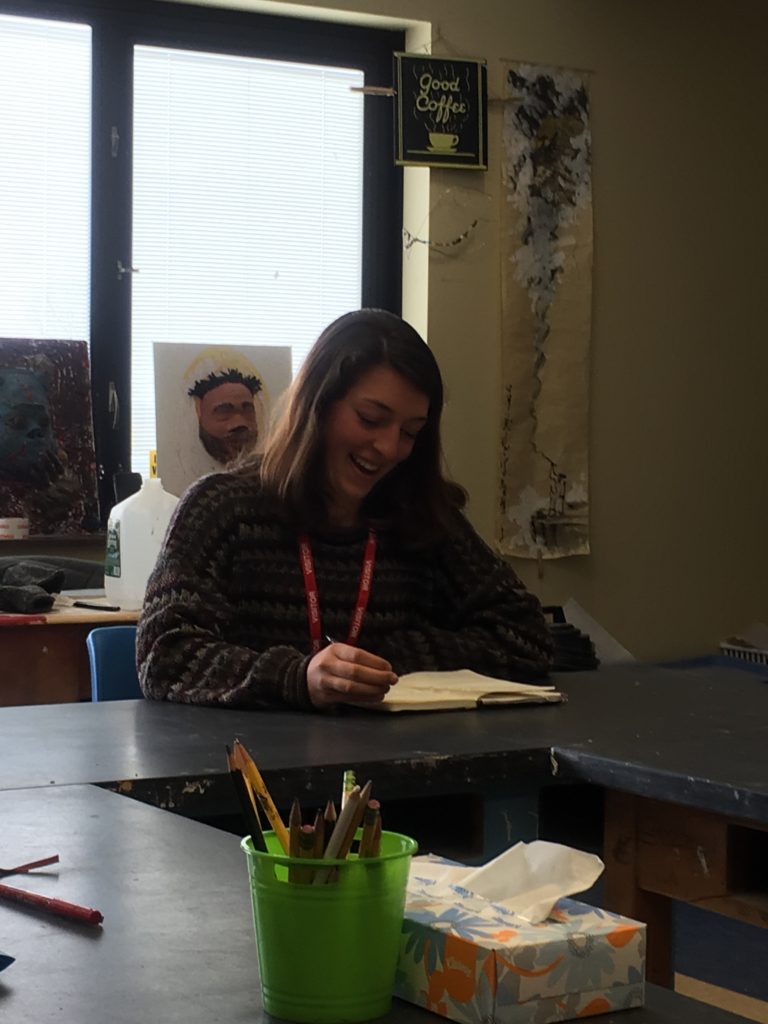
Deliver
Although our time with the students was short, and we have yet to see the finished product, we know that they were rapidly approaching their deadline. Each session, a student would use a computer in the art classroom to type up and perfect their piece for assimilation into the final booklet. Each student was very excited to showcase their work and looked for feedback on what poems reflected their best work. They are also discussing the possibility of having a showcase to perform their poems as a group. As previously mentioned, the students are very invested in the comics, and are eager to see the final versions after giving us feedback and seeing initial drafts in several stages. Even though we are no longer actively meeting, we have plans to send our final drafts to Poetic Justice. We are also awaiting the arrival of their printed booklet. When the Poetic Justice students finally deliver, it will be great to have a physical representation of their final project as a result of the co-consulting experience and as a touchstone to reflect upon our work there.
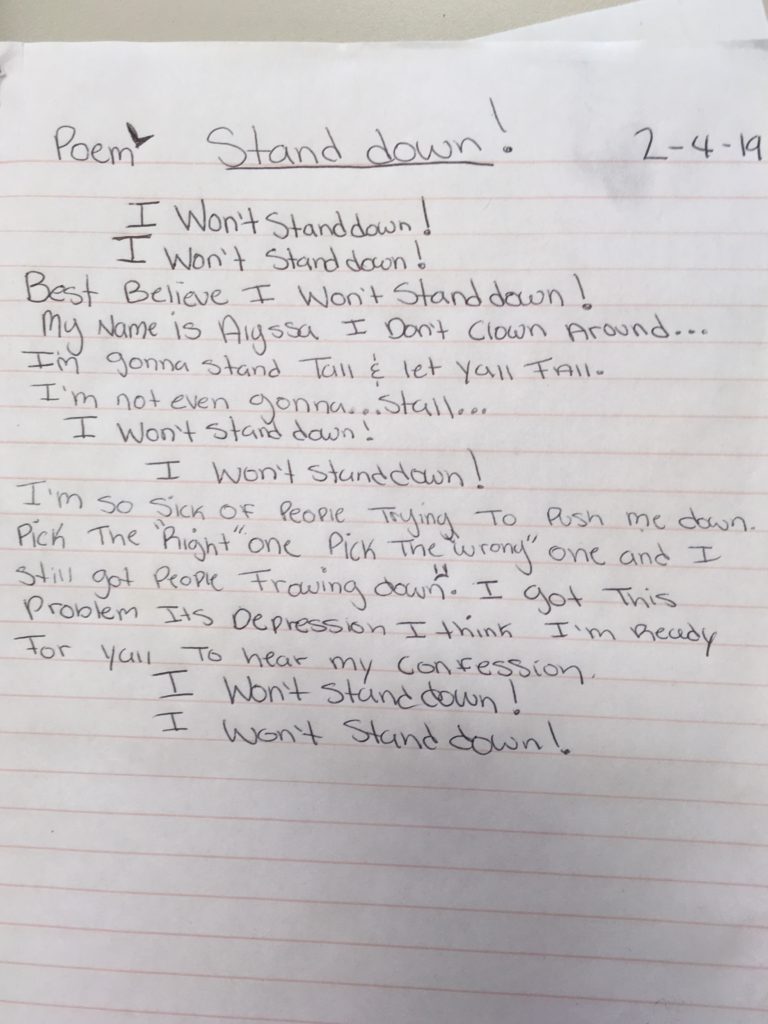
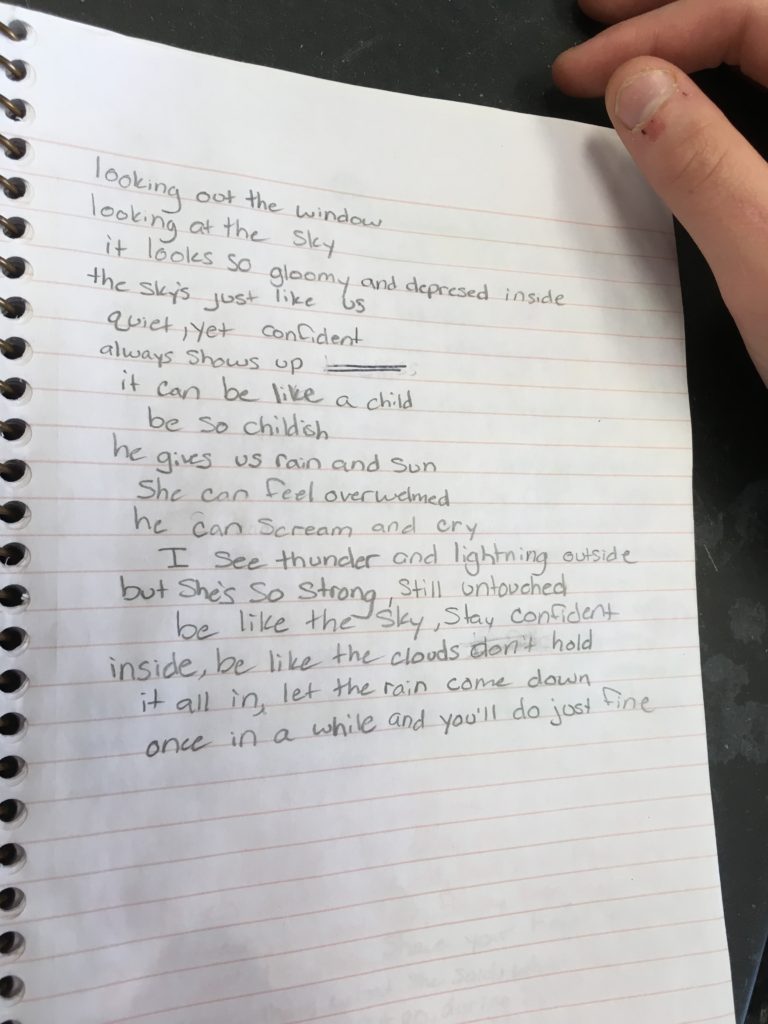
Recommendations
In thinking about the future of the co-consulting relationships built between this class and the George Junior Republic Poetic Justice club, there are several ways in which future iterations of the course could be refined to provide a more enriching, constructive experience for all parties involved in the co-consulting. Having gone through the experience, our team has identified three key ways in which the co-consulting approach could be improved: (1) better communication of expectations from the onset, (2) changing the nature of the projects, (3) fostering sustainability. See the following numbered bullet points for more detail regarding these recommendations:
Planning & Implementation
The first strategy to improve the co-consulting experience is to establish better communication of expectations between our Cornell class and the presiding figures at George Junior Republic from the onset. Throughout the relationship there was confusion on both sides regarding what the other community partner needed and where they were in the process. Before the onset of each semester, the presiding figures at George Junior Republic should meet with Professor McKenzie to go over each stakeholder’s objectives and create a schedule – taking into consideration each institution’s academic calendar – of how each scheduled meeting will work toward meeting those objectives for that semester. When the semester begins, Professor McKenzie, the presiding figures at George Junior Republic, and the student group working at George Junior Republic should all meet to go over and understand the shared objectives, where the objectives differ, and the engagement schedule. If everyone knows what to expect both broadly from the co-consulting relationship’s end goal and also specifically from each scheduled meeting, then the co-consulting relationship will be more productive because the already limited time we have with our community partner won’t need to be misused on figuring everything out as we go along. Of course, keeping the suggestions from Art of Transformation article in mind, the co-consulting relationship would still be flexible and not have to stick to a rigid schedule, but it would still be better to have some sort of established structure for the co-consulting relationship.
Align Projects
The second strategy to improve the co-consulting experience is to change the nature of the projects. We suggest that, similar to the Urban 4H co-consulting group, that the group at George Junior Republic should work on something comparable or complementary to the poem booklet of the students instead of working in the totally dissimilar media of Comics. Having students from the Cornell class work on a comic as Poetic Justice students work on poetry booklet is good in theory because it exposes students to multiple forms of media, but in practice the differing forms of deliverables is fragmenting. Instead, it might be more constructive to work in similar media or find a different community partner that wants to work with comics, too. If the projects each student group was working on was better aligned with each community organization, then the co-consulting process would be far more sensible, seamless, and straightforward.
Partnership Sustainability
The final and most significant area that needs to be addressed for improvement is the sustainability of the co-consulting relationship between our course and the George Junior Republic Poetic Justice club. Essentially, the co-consulting relationship faces the regrettable possibility of immediate disintegration because Rachel Whalen is graduating in May 2020. Thus, Rachel will no longer be able to continue on as both the program organizer for the Poetic Justice club or the cohesive glue bridging Cornell and George Junior Republic. The clear recommendation here is to find someone to take Rachel’s place. Thankfully, it seems as though there is already a figure in place: Kar Robison is another Cornell PSC student who, along with Rachel, volunteers at the George Junior Republic Poetic Justice club. Another sustainability-oriented recommendation is to get the Cornell PSC directly involved with this class. If the PSC were to directly funnel students into the class, then there would be a continual group of students already looking to take on such projects and be willing to commit to the George Junior Republic Poetic Justice club beyond the timeframe of an academic semester. Such commitment would ultimately foster much stronger, longer lasting bonds between the two institutions.
To conclude, the co-consulting relationship formed between our ENGL 3471 project team and the Poetic Justice club at GJR throughout the semester was both personally rewarding and productive. The experience will be a touchstone for each of us in our respective fields (i.e. English, Sociology, and Media Design) and as we continue to be involved in various communities we will continue to apply the experiential knowledge we gained from this class. Special thanks to Professor McKenzie, Rachel Whalen, and the students of the GJR Poetic Justice club for making this opportunity possible for us.
